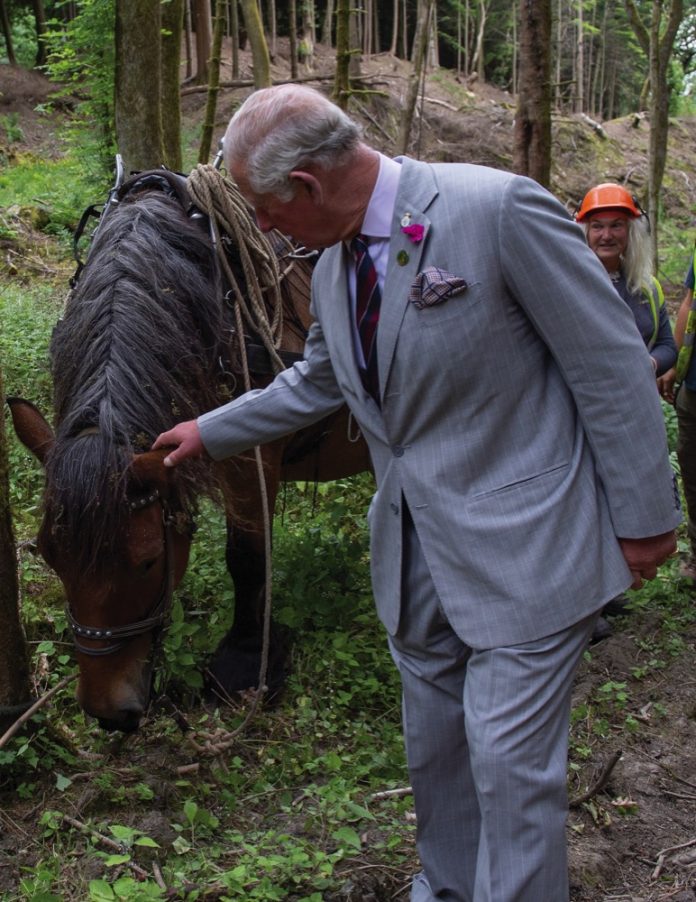
THE PRINCE OF WALES WILL VISIT POUNDBURY
WEDNESDAY 9th JUNE 2021
The Prince of Wales, in his role as Duke of Cornwall, head of the Duchy of Cornwall, will visit Rainbarrow Farm near Poundbury, Dorset, to view its ground-breaking Anaerobic Digestor plant and officially open BioCarbonics, a new joint venture that will produce green CO₂ in a sustainable manner for use by the food and drink and horticultural industry.
His Royal Highness will be greeted on arrival by board members from J V Energen, a joint venture partnership between the Duchy of Cornwall, local farmers and Active Business Partnership. The Prince will undertake a tour of the site to see the production process, inspect the soil enricher bagging plant, the new CO₂ plant and hear about various upgrade work. During the tour, His Royal Highness will meet site staff who have been instrumental in the project’s success. Before departing, The Prince will unveil a plaque to officially open the BioCarbonics joint venture.
J V Energen at Rainbarrow Farm
Championed by The Prince of Wales, the pioneering Rainbarrow Farm AD plant was the UKs first commercial biomethane-to-grid plant, currently generating enough gas to reach 7,500 houses mid-winter and over 100,000 houses in summer, five times the population of Dorchester. Biogas produced at Rainbarrow Farm was first cleaned and injected as biomethane into the national gas network on 11 October 2012. This led to a joint venture partnership being formed, J V Energen LLP, between the Duchy of Cornwall, local farmers who needed more sustainable break crops and fertiliser sources, and Active Business Partnerships.
Further development at Rainbarrow Farm has led to the digestate by-product of the AD process being used and sold as an organic, peat free, nutrient rich soil enricher called ‘Bloomin AmazingTM’, which is bagged as a soil enricher for sale to over 350 garden centres, and helps local farmers significantly reduce reliance on artificial fertilisers.
For more information on how the anaerobic digestion process works, see these helpful diagrams.
The Prince of Wales, in his role as Duke of Cornwall, Head of the Duchy of Cornwall, is paying a visit to Rainbarrow Farm in Dorset to see its Anaerobic Digester, which uses plant and animal waste to generate renewable heat and power. ♻️ pic.twitter.com/TxJ5yDomyx
— The Prince of Wales and The Duchess of Cornwall (@ClarenceHouse) June 9, 2021
BioCarbonics
The inaugural opening of this BioCarbonics joint venture green CO2 facility marks the launch of a pioneering model for the UK’s CO2 industry, where green CO2 is recovered from a network of renewable energy sources to produce a more sustainably sourced product with an improved continuity of supply to be used by local independent businesses. The CO2 produced at J V Energen’s Rainbarrow Farm Anaerobic Digestion (AD) plant is captured and processed into a high-quality food and beverage grade product, where it is used for the carbonation of beverages, to enhance photosynthesis in glasshouse production of fruits and vegetables, and for other various applications.
Most of the CO2 used in the UK comes from industrial fossil fuel processes with an historically unreliable continuity of supply. BioCarbonics is changing that by relying on multiple, smaller sources of “green” CO2, which is recovered from biomethane production, where clean, green feedstocks are being converted into green gas for use in the national gas network to heat local homes and businesses.
The launch is a landmark moment for J V Energen, to complete the sustainable usage of its by-products, and complement its renewable green energy production of gas and electricity. Green CO₂ recovery at Rainbarrow Farm currently operates 12-14 hours per day, and will be moving to 24/7 production by mid-June. This facility will produce ±24 lorries per month when fully loaded.
HRH officially opens the #BioCarbonics facility, a new joint venture that will produce green CO₂ in a sustainable manner for use by the food and drink and horticultural industry.
— The Prince of Wales and The Duchess of Cornwall (@ClarenceHouse) June 9, 2021
The captured CO₂ has a number of uses – including making fizzy drinks! 🍺 pic.twitter.com/MdPyYfvH1g
The Prince of Wales
For over fifty years, The Prince of Wales has used his unique position to champion action for a sustainable future. In the context of global challenges that include the climate crisis, deforestation, and ocean pollution, The Prince has promoted sustainability to ensure that the natural assets upon which we all depend, soil, water, forests, a stable climate and fish stocks among others, endure for future generations. His Royal Highness believes that economic and social development will best succeed when it works in harmony, rather than in conflict, with Nature.
Over the decades, The Prince of Wales has launched a number of sustainability initiatives aimed at delivering practical outcomes. In late 2019, His Royal Highness launched the Sustainable Markets Initiative. As well as addressing environmental challenges, The Prince promotes a more sustainable approach to planning and designing homes and communities in ways that enhance and add to the social, natural and built environment.
The Duchy of Cornwall
The Duchy has been run under the stewardship of The Prince of Wales, the current Duke of Cornwall, since 1969. He is the longest serving Duke of Cornwall in history, with 2019 marking his 50th year in charge. The Duchy is run in accordance with The Prince’s own social and environmental values. He ensures that, as well as providing him with an income, the estate must also focus on supporting the communities who live and work there, as well as protecting the land itself for future generations. This dual strategy has been at the heart of The Prince’s vision for the last five decades and makes the estate unique amongst other similar organizations.
Poundbury is an urban extension to the Dorset county town of Dorchester, built on Duchy of Cornwall land according to architectural principles advocated by The Prince of Wales. The Prince has long been concerned by the quality of both the natural and built environments in which we live.
To date, approximately 1,600 homes have been built for around 3,500 people, 35% of which are affordable housing. Poundbury is providing employment for more than 2,300 people working in the 183 shops, cafés, offices and factories. When completed in around 2026, Poundbury will have grown to 2,600 homes, increasing Dorchester’s population by approximately twenty-five per cent.
As Poundbury has developed, it has demonstrated that there is a genuine alternative to the way in which we build new communities in this country, adding real value that benefits the local community, economy, landowner and developers alike. It gives priority to people, rather than cars, and commercial buildings are mixed with residential areas, shops and leisure facilities to create a walkable community. The result is an attractive and pleasing place, in keeping with the character of Dorchester, in which people live, work, shop and play. As an exemplar of modern development, it regularly hosts visits from architects, town planners, policy makers, academics, developers and house builders from across the world.









